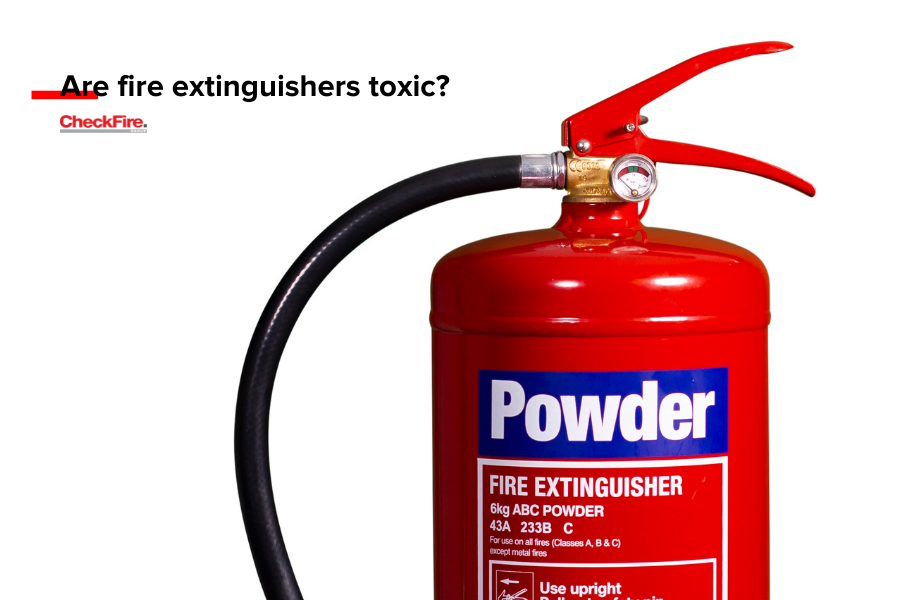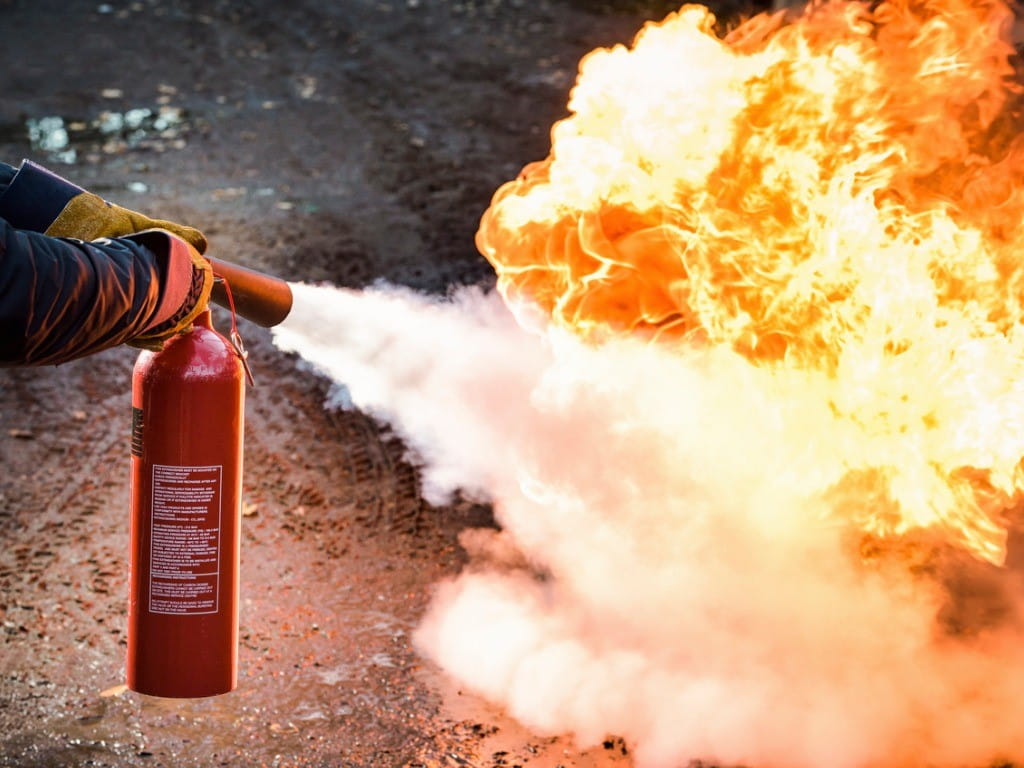ABC fire extinguisher powder can be mildly toxic if inhaled or ingested. It is not considered highly dangerous but requires caution.
ABC fire extinguishers use a dry chemical powder that is effective on various types of fires. This powder typically contains monoammonium phosphate, which can irritate the respiratory system and skin upon contact. While not highly toxic, prolonged exposure or ingestion can cause health issues such as coughing, difficulty breathing, and skin irritation.
Proper handling and usage are crucial to minimize risks. Always ensure good ventilation when using these extinguishers and wash hands thoroughly after contact. Consult a medical professional if significant exposure occurs. Understanding the potential hazards ensures safe and effective use of ABC fire extinguishers.
Introduction To Abc Fire Extinguishers
ABC fire extinguishers are common in homes and businesses. They are versatile and effective. These extinguishers tackle multiple types of fires. But what are ABC fire extinguishers exactly? Let’s explore.
What Are They?
ABC fire extinguishers use a special powder. This powder can fight three types of fires. The “A” stands for ordinary combustibles like wood and paper. The “B” represents flammable liquids such as gasoline and oil. The “C” signifies electrical fires.
The powder in these extinguishers is monoammonium phosphate. This chemical is effective and quick. It smothers the fire and cuts off oxygen. This action stops the fire from spreading.
Common Uses
ABC fire extinguishers are versatile. They are found in many places. Homes, schools, and offices often have them. They are also in cars and workshops.
Their ability to handle different fires makes them popular. They are ideal for kitchens with various fire risks. Electrical fires in offices also need them. These extinguishers provide safety and peace of mind.
| Location | Reason for Use |
|---|---|
| Homes | Variety of fire risks |
| Offices | Electrical equipment |
| Kitchens | Cooking fires |
| Workshops | Flammable materials |
Composition Of Abc Fire Extinguisher Powder
The composition of ABC fire extinguisher powder is key to its effectiveness. Understanding its ingredients helps determine its safety and functionality. Let’s dive into what makes up this fire-fighting agent.
Key Ingredients
ABC fire extinguisher powder contains several important ingredients. The primary component is monoammonium phosphate. This chemical is effective against Class A, B, and C fires. It’s also known for its quick action in smothering flames.
Another ingredient is ammonium sulfate. This compound aids in fire suppression. It helps by creating a barrier between the fire and oxygen. Both of these chemicals work in tandem to tackle various types of fires.
How It Works
ABC fire extinguisher powder works by disrupting the chemical reaction of a fire. When sprayed, the powder coats the burning material. This coating cuts off the fire’s oxygen supply, suffocating the flames.
The powder also has a cooling effect. It absorbs heat, reducing the fire’s temperature. This dual action makes ABC powder highly effective in controlling fires quickly.
Here is a table summarizing the key ingredients and their functions:
| Ingredient | Function |
|---|---|
| Monoammonium Phosphate | Smothers flames, effective against Class A, B, and C fires |
| Ammonium Sulfate | Creates a barrier between fire and oxygen, aids in suppression |
Toxicity Concerns
Understanding the potential toxicity of ABC fire extinguisher powder is crucial. It impacts both health and the environment. This section explores key concerns related to health risks and environmental impact.
Health Risks
ABC fire extinguisher powder contains chemicals like monoammonium phosphate. Exposure may cause irritation to eyes, skin, and lungs. Breathing in the dust can lead to respiratory issues.
- Skin Contact: May cause itching or redness.
- Eye Contact: Can lead to tearing and discomfort.
- Inhalation: Can trigger coughing, throat irritation, and shortness of breath.
Long-term exposure is rare but can lead to chronic respiratory problems. Immediate washing with water is advised if contact occurs.
Environmental Impact
ABC fire extinguisher powder can harm the environment. It affects soil and water bodies.
| Aspect | Impact |
|---|---|
| Soil | Decreases fertility and affects plant growth. |
| Water | Contaminates water bodies and harms aquatic life. |
Proper disposal is essential to minimize environmental damage. Avoid releasing the powder into drains or natural water sources.
Exposure Scenarios
Understanding the potential risks associated with ABC fire extinguisher powder is vital. Let’s explore the exposure scenarios. These include inhalation risks, skin contact, and ingestion.
Inhalation Risks
Inhaling ABC fire extinguisher powder can cause various health issues. The powder can irritate the respiratory tract. This may lead to coughing and shortness of breath.
People with asthma may experience worse symptoms. Always use a mask when handling the powder.
Ventilation is crucial. Ensure the area is well-ventilated during and after use.
Skin Contact
Contact with the powder can irritate the skin. Some people may develop rashes or itching.
Wear gloves to protect your hands. Wash your skin with water and soap if contact occurs.
If irritation persists, seek medical advice.
Ingestion
Ingesting the powder is dangerous. It can cause stomach pain and nausea.
Keep the powder away from food and drinks. Always store it in a safe place.
If ingested, drink plenty of water and seek medical help immediately.
Safety Measures
Ensuring the safe use of ABC fire extinguisher powder is essential. This section will guide you through the best practices for handling and storing this powder safely.
Proper Handling
Always handle ABC fire extinguisher powder with care. Wear protective gloves and a mask. This helps prevent skin contact and inhalation.
Avoid direct contact with the powder. If it touches your skin, wash the area thoroughly. Use soap and water immediately.
If the powder gets into your eyes, rinse them with water. Seek medical attention if irritation persists.
Storage Guidelines
Store ABC fire extinguisher powder in a cool, dry place. Keep it away from heat sources and direct sunlight.
Ensure the storage area is well-ventilated. This helps prevent inhalation of any dispersed powder.
Keep the extinguisher in an upright position. This prevents the powder from settling unevenly.
Check the expiry date regularly. Replace the extinguisher if it is expired.
Store it out of reach of children. This ensures their safety.

First Aid Responses
ABC fire extinguisher powder is used to put out fires. But it can be harmful to people. Knowing what to do if exposed is key. This guide covers first aid responses.
If Inhaled
If someone breathes in ABC fire extinguisher powder, follow these steps:
- Move the person to fresh air immediately.
- Loosen tight clothing around their neck and chest.
- Watch for signs of distress like coughing or difficulty breathing.
- If symptoms persist, seek medical attention.
Skin Or Eye Contact
If the powder gets on the skin or in the eyes, take these actions:
- Rinse the skin with water for at least 15 minutes.
- For eyes, flush with water, keeping the eyelids open.
- Avoid rubbing the affected area.
- If irritation continues, consult a doctor.
If Ingested
If someone swallows ABC fire extinguisher powder, do the following:
- Do not induce vomiting.
- Rinse the mouth thoroughly with water.
- Give the person small sips of water to drink.
- Contact a healthcare provider for further advice.
Regulations And Standards
Understanding the regulations and standards of ABC fire extinguisher powder is essential. These guidelines ensure safety and proper usage. Both industry guidelines and government regulations play a crucial role.
Industry Guidelines
The fire safety industry follows strict guidelines. These guidelines ensure the non-toxicity of ABC fire extinguisher powder. The National Fire Protection Association (NFPA) is a key organization. They set standards for fire safety products.
The NFPA 10 Standard for Portable Fire Extinguishers is vital. It provides information on the proper use and maintenance of fire extinguishers. Adhering to NFPA guidelines ensures the extinguisher powder is safe.
Industry guidelines also include testing procedures. This ensures the powder is effective and non-toxic. Manufacturers must follow these procedures to ensure safety.
Government Regulations
Government regulations ensure the safety and effectiveness of fire extinguishers. The Occupational Safety and Health Administration (OSHA) is a key agency. They set regulations for workplace safety, including fire safety.
The Environmental Protection Agency (EPA) also plays a role. They ensure that fire extinguisher powder does not harm the environment. The EPA sets limits on chemical compounds in the powder.
Regulations by the Consumer Product Safety Commission (CPSC) ensure product safety. They monitor the safety of consumer products, including fire extinguishers. The CPSC ensures that ABC fire extinguisher powder is non-toxic.
Below is a table summarizing key agencies and their roles:
| Agency | Role |
|---|---|
| NFPA | Sets industry standards |
| OSHA | Regulates workplace safety |
| EPA | Ensures environmental safety |
| CPSC | Monitors consumer product safety |
Compliance with these regulations ensures that ABC fire extinguisher powder is safe and effective. Proper adherence to guidelines and regulations is crucial for safety.
Alternatives And Solutions
Many people are concerned about the toxicity of ABC fire extinguisher powder. It is important to consider safer options. Here, we explore alternatives and new innovations for fire safety.
Safer Alternatives
There are several safer alternatives to ABC fire extinguisher powder:
- Water-based extinguishers: These are best for fires caused by paper, wood, and cloth.
- Foam extinguishers: Effective for fires involving flammable liquids and solids.
- CO2 extinguishers: Ideal for electrical fires and flammable liquids.
Each type has its own benefits and safety profile. Choose the one that fits your needs.
Future Innovations
Exciting innovations in fire safety are on the horizon:
- Eco-friendly extinguishing agents: New agents are less toxic and environmentally friendly.
- Smart fire extinguishers: These devices can detect fire and act automatically.
- Nanotechnology: Advanced materials could make extinguishers more effective and safer.
These innovations aim to increase safety and reduce environmental impact.

Frequently Asked Questions
Is Abc Fire Extinguisher Powder Safe?
ABC fire extinguisher powder is generally safe but can cause skin, eye, and respiratory irritation.
Can You Inhale Abc Extinguisher Powder?
Inhaling ABC extinguisher powder can irritate the respiratory system. It’s best to avoid breathing it in.
What Is Abc Fire Extinguisher Powder Made Of?
ABC fire extinguisher powder typically contains monoammonium phosphate and ammonium sulfate, both effective for extinguishing various fires.
Conclusion
Understanding the potential toxicity of ABC fire extinguisher powder is crucial for safety. While it is generally safe, precautions are essential. Always follow manufacturer guidelines and use protective gear when handling. Ensuring proper ventilation and cleaning up promptly can minimize risks.
Stay informed to maintain a safe environment.
